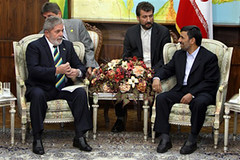
Iran and Brazil leaders discuss a deal involving nuclear fuel production. Iran has been under fire by western imperialist states and Israel.
Originally uploaded by Pan-African News Wire File Photos
00:53 Mecca time, 21:53 GMT
Iran 'agrees' nuclear fuel swap
The announcement followed a day of meetings between Iranian and Brazilian officials
Iran, Turkey and Brazil have reached a deal on procedures for a nuclear fuel swap aimed at easing concerns over Tehran's nuclear programme, Ahmet Davutoglu, Turkey's foreign minister, has said.
Davutoglu announced the agreement at a news conference late on Sunday after Recep Tayyip Erdogan, Turkey's prime mininster, postponed a trip to Azerbaijan to join talks on the issue in Tehran.
He said the deal was reached "after almost 18 hours of negotiations"; a formal announcement is expected on Monday morning.
Erdogan flew into Tehran after Luiz Inacio Lula da Silva, Brazil's president, held a day of talks with Mahmoud Ahmadinejad, his Iranian counterpart, in what had been portrayed by the US and Russia as a last chance to avoid new sanctions.
Turkish television reported that the three leaders discussed a deal that would see the exchange in Turkey of Iran's low-enriched uranium for nuclear fuel processed abroad.
But details - such as the amount of uranium to be handed over, and how the proposed exchange would take place - have not yet been released.
Announcement expected
Al Jazeera's Alireza Ronaghi, reporting from Tehran, said that a Group of 15 summit was scheduled to begin Monday morning in Tehran, and that the fuel swap could be announced at the opening of the meeting.
"The G15 summit will be inaugurated by a speech by President Ahmadinejad and I expect that speech to include some elements about the deal," he said.
"I expect that he will be as defiant and aggressive as ever, but at the same time it will show that Iran is for negotiations and it is giving these concession to show Iran's goodwill."
Speculation had been growing that something would be announced after Erdogan changed his travel plans. The Turkish prime minister had initially cancelled his plans to visit Iran.
Lula's visit, which has included a meeting with Ayatollah Ali Khamenei, Iran's supreme leader, as well as Ahmadinejad, was seen as a last ditch attempt to mediate a deal.
Before departing for Tehran, Lula had said that he was "optimistic" about the visit, and that he hoped to persuade Ahmadinejad to reach an agreement with the West over its nuclear work.
"I must now use everything I have learned over my long political career to convince my friend Ahmadinejad to come to an agreement with the international community," he said.
The US and Russia had warned that the chances of success were weak. But before the talks, Tehran signalled a willingness to listen to any proposals.
"We have received many proposals and we are considering them," Ali Akbar Salehi, Iran's atomic chief, was quoted as saying on Saturday in local media.
"There is a willingness on both sides to resolve the problem and things are moving positively."
Iranian reluctance
Iran has previously been reluctant to allow its stockpile of uranium to leave the country before receiving the nuclear fuel, saying that the exchange must take place simultaneously inside the country.
Last week, however, Mohsen Shaterzadeh, Iran's ambassador to Brazil, said that an exchange in another country might be acceptable.
Brazil and Turkey, both non-permanent members of the UN Security Council, have so far failed to support US-led efforts to push through new sanctions against Iran over its failure to accept repeated ultimatums to stop uranium enrichment activity.
"I think Iran has an interest in keeping Turkey on its side, in keeping Brazil on its side, and it has an interest to add more friends than enemies," Mahjoob Zweiri, an Iran expert at Qatar University, told Al Jazeera.
The US and its allies say that Iran wants highly enriched uranium to make an atomic weapon, but Tehran says its programme is simply designed to meet its civilian energy needs.
Lula has in the past defended Iran's nuclear activities, saying Tehran has the right to atomic energy, and has repeatedly said sanctions would be counter-productive and ineffective.
Source: Al Jazeera and agencies
No comments:
Post a Comment